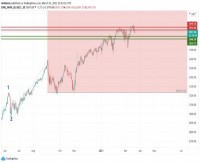|
Opalesque Industry Update - By Donald A. Steinbrugge, CFA, Managing Partner Agecroft Partners: The Federal Reserve increased its target range for the federal funds rate by 25 bps to 1.50-1.75% on Wednesday, March 21. This marks the 6th incremental increase since December 2015 following the dramatic cut in rates during the financial crisis. In addition, the Fed has indicated that it is forecasting 2-3 more increases in 2018, 3 increases in 2019 and 2 more increases in 2020. If the Fed follows through with its projected rate hikes, we can expect a federal funds rate of 3.5% by 2020. Most people associate rising interest rates with declining asset values. In fixed income markets, there is an inverse relationship between interest rates and bond values whose sensitivity to interest rates is measured by duration. This relationship also applies to equity valuations, though to varying degrees due to different valuation methods. Many investors believe that, ultimately, the value of a company is the present value of its future earnings. Future earnings are negatively impacted by increasing interest rates which increase the cost of borrowing and reduce many firms' bottom lines. Additionally the present value of those future cash flows is reduced when discounted at a higher interest rate. Nonetheless, rising short term rates can have a positive impact for the many hedge fund strategies that hold large cash positions. One example of a hedge fund strategy that holds a lot of cash is Commodity Trading Advisors (CTAs). CTAs take positions in commodities, currencies, equity indexes, and interest rates through the futures market. The inherent leverage structured into these instruments result in many CTAs deploying only 10-20% of their capital. The balance is allocated to short term fixed income instruments. Another example of this is market neutral long short equity. A manager with a 100% long and a 100% short exposure will have a gross exposure of 200% and a net exposure of 0%. In order to get the short exposure the manager has to borrow and then simultaneously sell the securities. The short rebate from selling these securities is tied to short term fixed income rates with the exception of hard to borrow stocks. A third example of this can be seen in reinsurance. Reinsurance hedge funds are required to be fully capitalized for potential liabilities/claims that they may incur. These assets are also typically invested in cash or very short term, highly rated securities. CTAs, market neutral LS equity, and reinsurance are just a few examples of the many different hedge fund strategies that generally include large, short term fixed income portfolios. Rates rising from close to 0% to over 3% on short term securities will have a direct and meaningful impact on the expected returns these strategies should generate going forward. Higher expected returns for strategies that have high cash allocations will have 2 major implications on the hedge fund industry: 1. Strategies with large cash positions will grow their market share of the hedge fund industry at the expense of other strategies. The $3 trillion hedge fund industry is a mature one. Most allocations result from investor's thoughtful evaluation, across strategies and managers, as to which offer the best opportunity to add value. These decisions inform not only new allocations, but reallocations from existing managers. Often there is only a 1-2% difference of the expected return among potential hedge fund strategies on an investors' shortlist. In a rising interest rate environment, the enhanced returns from strategies with large cash positions should make these strategies significantly more attractive. 2. Increased the probability that large institutional investors will negotiate a hurdle on performance fees. There has been significant and growing pressure on fees within the hedge fund industry by large institutional investors. Their focus has been on multiple factors including management fees, performance fees, hurdles and performance crystallization time frames. If short term rates continue to rise we expect to see more institutional investors asking for a performance hurdle for the carried interest portion of performance attributable to the cash position of the portfolio. |
Industry Updates
Steinbrugge: Rising short term interest rates should help some hedge fund strategy returns
Tuesday, April 03, 2018
|
|





 RSS
RSS








